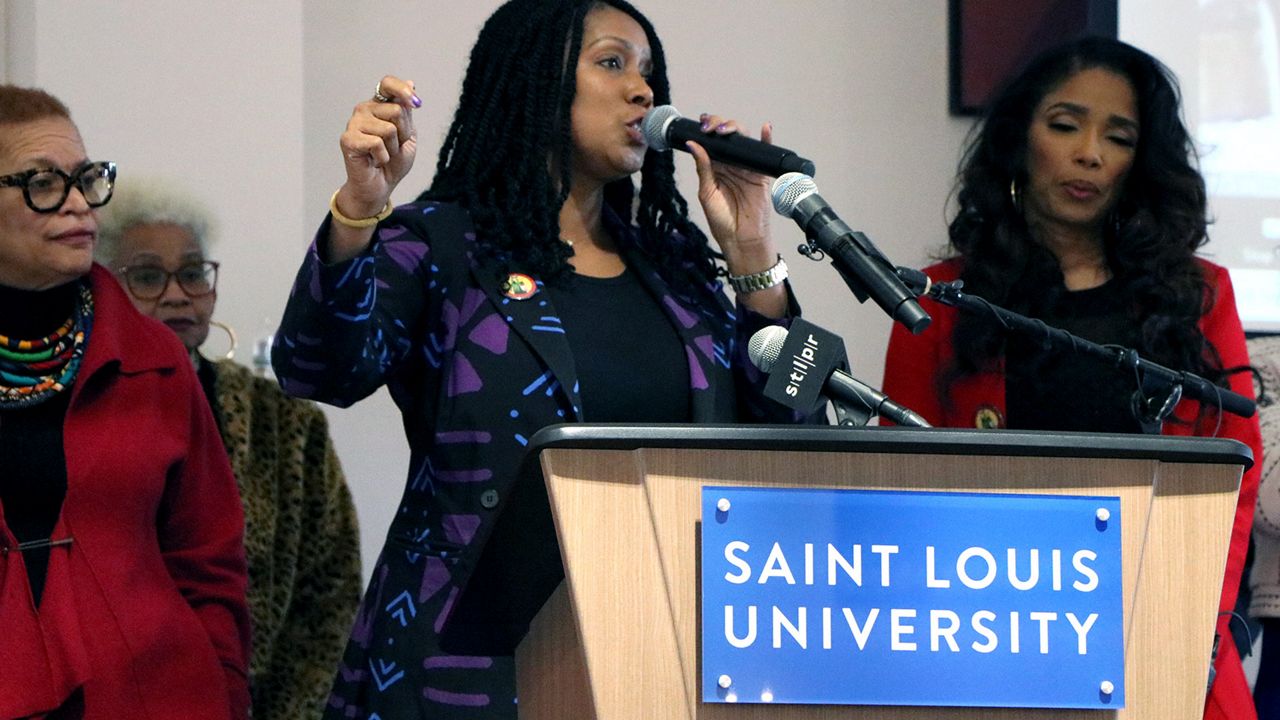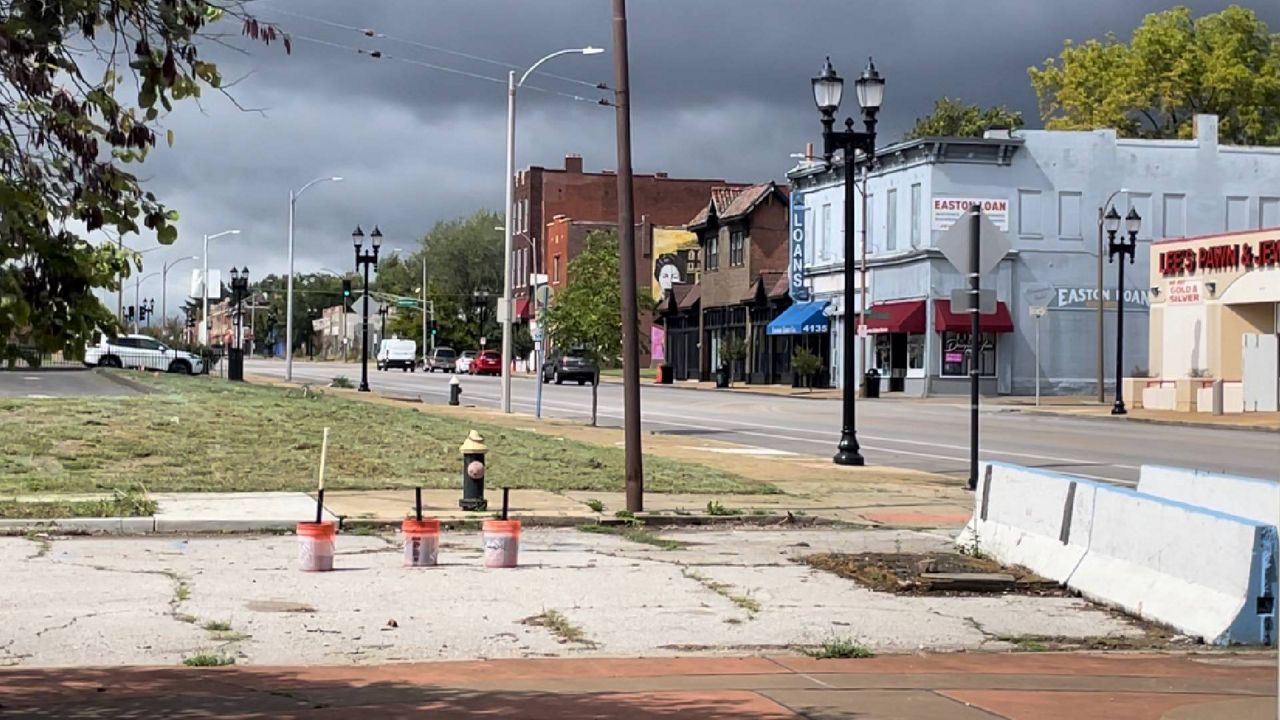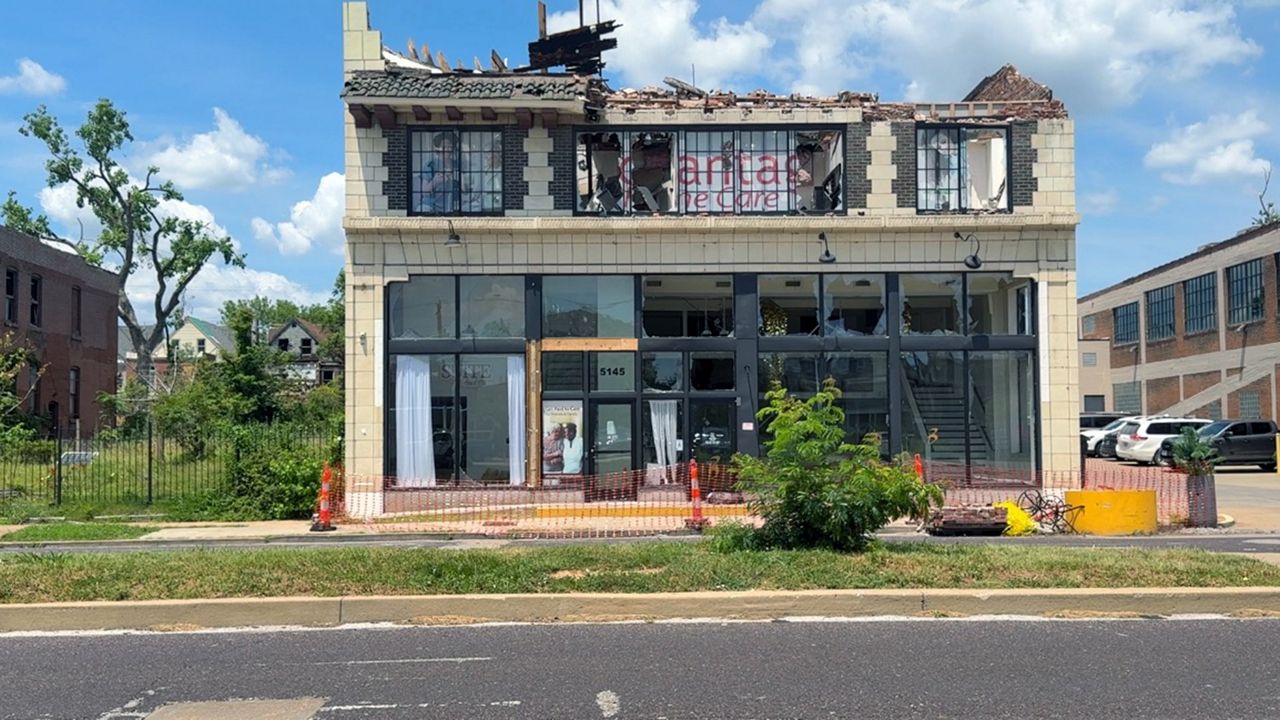ST. LOUIS — In an effort to pressure St. Louis University officials to honor and support the descendants of slaves who helped build the campus, civil rights attorney Areva Martin on Thursday announced $70 billion in reparations owed to them.
Martin is representing approximately 200 descendants of Henrietta Mills and Charles Chauvin who are part of the Descendants of the St. Louis University Enslaved (DSLUE) nonprofit organization.
“We’re not asking for a handout. We’re asking for their debt to be paid,” said Robin Proudie, a descendant of those enslaved by St. Louis University and president of DSLUE.
She stood on stage alongside her relatives.
“We decided as a family that we would stand up not only for us, but for all of the enslaved descendants of those who built this country,” Proudie said.
On Thursday, Martin and descendants held a press conference and teach-in at the Busch Student Center on SLU’s campus. They were joined by economist Julianne Malveaux and State Sen. Karla May (D-04).
Martin said Mills and Chauvin were married slaves owned by the St. Louis University Jesuits and were instrumental, along with others, in the building of SLU.
SLU investigated its history and relationship to slavery, and in 2016, issued a report called “Slavery, History, Memory and Reconciliation Project.”
“That report revealed that Jesuits forcefully relocated slaves from Maryland in 1823 to St. Louis specifically to exploit their stolen labor and skills to build St. Louis University,” Martin said, adding that they owned, sold and trafficked slaves until 1865.
“We know that those enslaved were robbed of wages, and treated with cruelty and disregarded for their humanity,” Martin said.
In 2019, the Jesuits informed the descendants about their enslaved ancestors who were forced to work at the first Jesuit mission in Missouri, St. Stanislaus, SLU, St. Francis Xavier College Church and other local churches, farms and schools between 1823 and 1865, according to DSLUE.
“To confront this relationship with slavery, SLU undertook an effort of investigation, truth telling and healing,” Martin said.
A committee was then formed to work with the descendants on a path forward. When the committee went back to work in 2021 after the pandemic, Martin said the committee lacked representation from the descendants.
Later that year, the descendants and allies came together to form DSLUE with a “desire to commemorate and honor our Jesuit and St. Louis University ancestors.”
With access to economists and researchers, Martin said SLU had not disclosed the monetary value of the enslaved labor for the descendants into today’s money.
An estimated $365 million in unpaid labor was announced, and with added interest over time, amounts to $70 billion, according to Malveaux.
The number was based on labor done 24 hours per day, 365 days per year for 70 enslaved people from 1823-1865, she said.
“The calculations that we came up with and the method that we used are time-honored methods,” Malveaux said.
“The university, quite frankly, is overdue, negligent and wrong.”
Proudie said DLSUE has engaged with SLU in the spirit of collaboration and partnership. During a meeting with SLU President Fred Prestello in 2021, she said they were told the university was not ready for a reconciliation.
“We are gathered here today to be clear and concise in our message that by erasing the truth, we repeat the atrocities of the past,” May said. “The lives of the enslaved people, those who were taken from Maryland and brought to St. Louis, those lives must be acknowledged.”
A statement from SLU says the university cannot offer a detailed response yet from what was said at Thursday’s event, but there is a shared sense of urgency that was expressed by several members of the descendant community.
“SLU’s participation in the institution of slavery was a grave sin. We acknowledge that progress on our efforts to reconcile with this shameful history has been slow, and we regret the hurt and frustration this has caused,” the statement says.
“Continuing this work is a priority for SLU and the Society of Jesus. As we move forward, we hope to re-establish and build deeper relationships with all descendant families, to explore together how best to honor the memory of those who were enslaved by the Jesuits.”
After the press conference, Martin told Spectrum News that there will be a collaborative effort again between SLU and DSLUE.
“What we hope happens is that the university reconfigures this committee to include the voices of the descendants and that this first-ever review of economic value is a part of the conversation,” Martin said.
What the exact compensation looks like for the descendants is up for negotiations, she added.
“We hope this is a day that creates a pathway forward, shifts the paradigm and it allows for St. Louis University, first, and others that are doing this work, taking into consideration that really important economic information,” Martin said.









